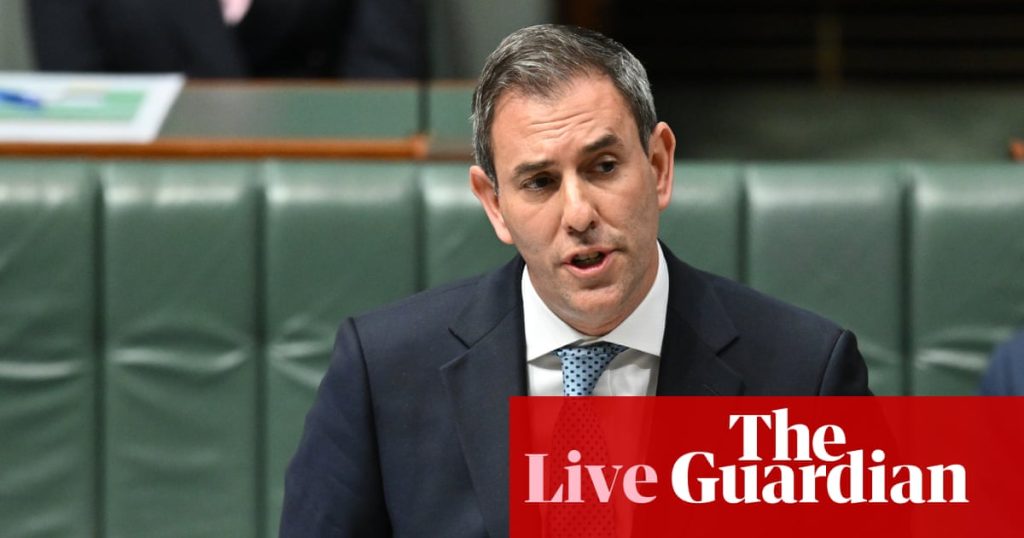Chalmers blames end of energy rebates, rising travel prices and fuel for big leap in inflation
Treasurer Jim Chalmers has blamed the end of state energy rebates, travel prices and fuel for the higher monthly inflation figures released by the ABS.
Inflation jumped to 2.8% in the year to July, from 1.9% in the month before, the highest rate in a year.
Chalmers said those were “volatile and one-off factors” and this was the eighth month in a row that the headline and underlying inflation rates were below 3%.
We know monthly inflation figures can jump around and are less reliable than the quarterly figures because they don’t compare the same basket of goods and services from month to month.
The official quarterly numbers show that both underlying and headline inflation are at their lowest rates in almost four years.
Key events
This day has already been a whirlwind, and there’s more to come… because we’re on the countdown to question time.
Yesterday’s question time started on the revelations from Asio that Iran had been behind two antisemitic attacks in Australia, and then moved to plenty of questions on tax settings – i.e the Coalition trying to push Labor to rule out taxes on family farms and family trusts.
We can expect more on Iran, and more on the economy today – particularly on those higher than expected inflation figures.

Patrick Commins
Economists say rise in inflation not the start of a resurgence in price growth
Economists are responding cautiously to this morning’s substantially stronger than expected inflation figure, saying that it’s not the start of a new resurgence in price growth.
Cherelle Murphy, EY’s chief economist, said “we still expect further interest rate cuts by the end of the year to make conditions less restrictive and support the economy”.
Taxpayer-funded energy bill subsidies are winding down this year, leading to higher household electricity costs, and this was reflected in the larger-than-expected jump in annual inflation: from 1.9% in June to a 12-month high of 2.8% in July.
ANZ economists noted there was also an 8% monthly spike in travel costs that they said was likely due to the British Lions rugby tour, rather than “the beginning of a new trend for travel”.
Rental costs were up 3.9% in the year to July, according to the ABS figures, lower than the 4.2% pace in June, and 4.5% in May.
Chalmers blames end of energy rebates, rising travel prices and fuel for big leap in inflation
Treasurer Jim Chalmers has blamed the end of state energy rebates, travel prices and fuel for the higher monthly inflation figures released by the ABS.
Inflation jumped to 2.8% in the year to July, from 1.9% in the month before, the highest rate in a year.
Chalmers said those were “volatile and one-off factors” and this was the eighth month in a row that the headline and underlying inflation rates were below 3%.
We know monthly inflation figures can jump around and are less reliable than the quarterly figures because they don’t compare the same basket of goods and services from month to month.
The official quarterly numbers show that both underlying and headline inflation are at their lowest rates in almost four years.
Greens claim win after Labor vows to wipe 1.2m historical debts
The Greens are claiming a win over Labor’s announcement that it will wipe around 1.2m historical debts of up to $250.
As my colleague Sarah Basford Canales brought you earlier, people whose entitlements were incorrectly calculated by the income apportionment method (which has been declared unlawful) between 2003 to 2020 will be eligible to apply for a $600 resolution payment. You can read more on income apportionment here.
The Greens have also been pushing for a six-year limit to be imposed on debt collection. Senator Penny Allman-Payne said:
Like robodebt, the income apportionment scandal has shown the systemic issues with the way our welfare system brutalises people living in poverty over ridiculous errors.
The work unpicking robodebt is far from done. The Greens will continue to push Labor to implement the outstanding robodebt recommendations including the six-year limit on debt recoveries.
Antipoverty Centre spokesperson Jay Coonan said the announcement was a “relief” and is also pushing the government to put a six-year limit on debt collection.
It is a relief to see the government beginning to take some action in response to its unlawful debt recovery, but we know these changes will not protect poor people from the harm done by debt raising and collection practices. They do not go anywhere near implementing the robodebt royal commission recommendations that the government committed to two years ago.
Government cites ‘unreasonable invasion of privacy’ after Bragg requests transparency over housing future fund
A little earlier I brought you the tussle in the Senate over an order for the production of documents by senator Andrew Bragg – for details from the government on how funding in the housing Australia future fund is being spent.
The Coalition is chasing which providers will be building the homes, where they will be and how much they will be paid.
Government minister Tim Ayres said the request is being “actively progressed”, but it looks like Bragg won’t be getting his hands on those documents at all.
A letter, seen by Guardian Australia, from the housing minister Clare O’Neil, says that disclosing how much money was paid to individual housing providers would be “an unreasonable invasion of privacy”.
She states in the letter that the documents contain commercially sensitive details.
The Coalition has said only 17 homes have been built under the HAFF, but that’s not correct, and has been disputed by the government. An AAP fact check from last week says federal funding has supported the construction of more than 2,400 homes.

Sarah Basford Canales
Reynolds says she’s not expecting apology from Labor for role in perpetuating ‘me too political hit job’
Linda Reynolds said she’s not expecting an apology from the Labor government for its role in perpetuating a ‘me too’ political hit job” against her but has urged them to read the WA supreme court’s findings “carefully”.
That’s because she’s also separately suing the federal government for its role in signing off on Brittany Higgins’ personal injury settlement without her involvement.
Reynolds has said she wasn’t able to defend against claims she hadn’t supported Higgins after she revealed her alleged Parliament House rape in 2019. Outside the court, Reynolds said:
This has been an incredibly emotionally and financially taxing journey, but I never gave up on the truth and on seeking justice for the gross, the very gross politicisation that allowed Ms Higgins to procure a multimillion dollar settlement… I’m not expecting an apology from the Labor government for their role in this… ‘me too’ political hit job. However, I do call on the Labor government, from the Australian government solicitors and HWL Ebsworth to carefully review Justice Tottle’s findings. It’s time for all of them to acknowledge they got it wrong.

Sarah Basford Canales
Reynolds says her reputation has been ‘finally and fully vindicated’
Following her win in the WA supreme court, Linda Reynolds tells reporters outside the court the judgment has “definitively established the truth” and that her reputation had been “finally and fully vindicated”.
Reynolds continued:
This lie was so shocking, it was so despicable and so devastating that I had no choice but to stand up tall and keep fighting no matter how many times I was knocked down, this lie devastated me. It devastated my staff, it devastated my family and so many friends… But let me be very, very clear today, this was never about Ms Higgins’ allegation of rape, and it was also never about the money, this action was always, it was always about the dishonest and devastating attack my reputation that was based on very carefully curated lies by Ms Higgins… Those lies cost me my reputation. It cost me my health.
Linda Reynolds awarded almost $350,000 in damages after winning defamation case against Brittany Higgins

Sarah Basford Canales
Brittany Higgins has been ordered to pay her former boss, ex-senator Linda Reynolds, almost $350,000 in damages after a Western Australian supreme court found she had defamed Reynolds.
Justice Paul Tottle delivered the judgment from Perth today finding Higgins’ social media posts in 2023 had defamed Reynolds and Higgins’ defence could not establish truth in any of them. However, Higgins’ legal team had been successful in convincing the court her social media post on 20 July 2023 was honest opinion, fair comment and qualified privilege.
The judge ruled Higgins would have to pay Reynolds $315,000 in damages with an interest payment of $26,109.25 as well as costs for the case.
Reynolds had also sought damages after claiming Higgins and her now-husband, David Sharaz, had conspired together to damage the former senator’s reputation. Justice Tottle said he did not find this was established and also dismissed Reynolds’ team’s attempt to place an injunction on Higgins speaking out further.
We’ll have more in a moment once the two parties leave the court.
Iran’s ambassador to Australia photographed leaving embassy
Iranian ambassador to Australia, Ahmad Sadeghi, has been photographed outside the Iranian embassy in Canberra.
The ambassador has been declared a “persona non-grata” in Australia, and has been expelled by the federal government, along with three other Iranian officials in the embassy.

Patrick Commins
Inflation jumps to highest rate in a year
Inflation has jumped to 2.8% in the year to July, from 1.9% in the month before, in a tentative sign that lingering price pressures may be stronger than hoped.
The monthly data does not present a complete picture of consumer prices, but the rise was well above the 2.3% predicted by economists before the release of this morning’s ABS data, and the highest rate in a year.
As expected, electricity costs explained the reversal in the inflationary downward trend, but the size of the upswing was a surprise.
Electricity costs jumped by 13% in the year to July as government-funded energy bill subsidies elapsed. The ABS said:
The largest contributor was that households in NSW and ACT did not receive payments of the extended commonwealth energy bill relief fund in July.
Payment of rebates for households in NSW and ACT will instead commence in August. This means that those households had higher out-of-pocket costs for electricity in July. In addition to this, prices rose due to annual electricity price reviews coming into effect.
Removing the impact of large swings in some prices such as energy, the annual trimmed mean inflation climbed to 2.7%, from 2.1% in June, and also well above experts’ predictions.

Benita Kolovos
Victorian treaty bill delayed
The Victorian government has delayed introducing a bill that would formalise Australia’s first formal treaty with traditional owners.
Guardian Australia understands the government had planned to introduce a statewide treaty bill on Wednesday, after it was signed off in cabinet earlier in the week.
But the plans have been delayed due to the Porepunkah shooting. Police are still searching for Dezi Freeman, who they allege shot two police officers dead in an ambush at his property on Tuesday morning.
It is understood the government also wants to ensure the treaty is given the focus it deserves.
The bill is the culmination of almost 10 years of work by the Victorian Labor government, which has also included setting up the First Peoples’ Assembly – a democratically elected body representing Aboriginal and Torres Strait Islander people in treaty discussions – and the Yoorrook Justice Commission, which oversees the state’s truth-telling process.
If the bill passes, it will acquit voice, treaty, truth – the three pillars of reform requested in the 2017 Uluru statement from the heart. Victoria will become the first state in the country to achieve this.

Sarah Basford Canales
Tanya Plibersek says debt recovery process should be fair and transparent
The social services minister, Tanya Plibersek, said it was important for the debt recovery process to be fair and transparent.
She said:
This $300m package will mean Services Australia does not waste time or resources chasing accidental debts that are uneconomical to recover, and spare Australians with small debts significant stress. It will also provide compensation for those affected by the historical practice of income apportionment, in recognition of clear evidence it was invalid.
Read more:

Sarah Basford Canales
The government’s announcement today means those whose entitlements were incorrectly calculated by the method between 2003 to 2020 will be eligible to apply for a $600 resolution payment. The government said it was in “recognition of the fact that we now know this method of calculating entitlements was invalid”.
The government noted the reprieve would not be available for recipients where there has been “significant non-compliance or fraud” and it would “continue to recover every cent of debt in these circumstances”.
A bill will be introduced in the coming weeks to provide legal clarity for the debt calculation method.
Labor promises to wipe debts of up to $250 in ‘social security debt reform’

Sarah Basford Canales
The Albanese government has announced it will wipe about 1.2m historical debts of up to $250 in a move it claims is an “important first step toward systemic social security debt reform”.
In July, the federal court ruled the social services department could estimate a welfare recipient’s income using its preferred method, meaning thousands of recipients could now be liable for debts totalling more than $1bn and dating back decades.
Previously, Centrelink had made assumptions to calculate a welfare recipient’s wage in order to offer them the right amount of supplemental income. For example, a casual worker might be paid a lump sum for a fortnight’s work, which Centrelink could divide to find a daily or weekly wage within an income reporting period to determine their payment for that period.
That method, known as income apportionment, was used for decades but was ruled unlawful, placing a question mark on more than $1bn in debt owed by welfare recipients stretching back to the late 1970s.
Alex Ryvchin shocked but not surprised by Iran’s involvement in antisemitic attacks
Earlier this morning, Alex Ryvchin, of the Executive Council of Australian Jewry, said he wasn’t “surprised” or Iran’s involvement in two antisemitic attacks in Australia, but was still shocked by the events.
He told ABC’s News Breakfast he’d spoken to the owners of one of the targeted businesses and said they were “really rattled” by the revelations.
There was no surprise, really. But also, it still brought us a great degree of shock to know now definitively that this regime – which is responsible for so much misery and bloodshed, that is capable of such atrocities – honed in on our Australian Jewish community and committed attacks on Australian soil.
Andrew Bragg chastises Labor over lack of transparency
Over in the Senate this morning, the Coalition is having a crack at the government over its lack of transparency – after the shadow housing minister, Andrew Bragg, tried to get documents on spending in the housing Australia future fund (HAFF).
Bragg says the government can’t say how many houses have been built under the scheme, or show how the money has been spent.
He says the Department of Finance reported that $223m had been debited in 2024-25, of the $500m that is supposed to be spent under the HAFF each financial year. The auditor-general then told the opposition that the rest of the money, the $277m had been debited and given to Housing Australia to spend on round one of the HAFF.
But Bragg says there’s still no clarity on where that taxpayer money has gone – hence the order for the production of documents – that the government has so far failed to produce.
Bragg takes a shot at the government, and points to research by the Centre for Public Integrity that the: “FOI regime has sharply worsened under the Albanese government… The proportion of requests granted in full has fallen from 59% in 2011–12 to just 25%t in 2023–24. Meanwhile, refusals have nearly doubled – from 12% to 23%.” Bragg says:
It is a secretive government, it has a shocking record of responding to orders for production of documents …
This government is more secretive than a government led by a man who swore himself into secret ministries.
Greens senator Barbara Pocock also criticises the lack of transparency and says “ministers are making incontestable claims of public interest immunity and there is little recourse to hold them to account”.
Albanese says national security settings have not changed despite Iran revelations
Anthony Albanese has confirmed Australia’s diplomats in Iran were evacuated just after midnight on Monday, ahead of Tuesday’s press conference revealing Iran’s involvement in the two antisemitic attacks in Australia.
Speaking to the Daily Telegraph’s Bush Summit, Albanese says the government was given full briefings on Asio’s intelligence on Monday morning.
He says Iran has a history of “not respecting diplomats”, making their evacuation from Tehran critical.
We had full briefings about the fact that they were certain. You need to be certain. Be very clear the actions in expelling a diplomat isn’t something that you do for political purposes. It isn’t something that you do lightly.
Albanese also said this was “overwhelmingly, this was an Australian operation”, when asked about a report that Israel provided intelligence towards these revelations.
Intelligence agencies talked to each other, but this was credit, where credit’s due to director-general Mike Burgess and to our friends in Asio, this is something that Australians should be really proud of.
He added that Australia’s national security settings haven’t changed since yesterday’s revelations, and that Australians can “take confidence” in Australia’s national security agencies.
Government should have added IRGC to terror listing sooner, Sharma says
Australia had some grounds to list the Islamic Revolutionary Guard Corps as a terrorist organisation sooner, says Liberal senator and former ambassador to Israel, Dave Sharma.
Speaking to Sky News, Sharma says Iran’s involvement in the two antisemitic attacks was “shocking” and that in international relation terms, “this is about as serious and grave as you can get.”
The Coalition has said the government should have moved sooner to add the IRGC to the terror listing and expel the Iranian ambassador. Sharma said there has been cause to do so, and points to the terror listing of the IRGC in the US and Canada.
Asio has said publicly now on at least a couple of occasions over the past year, and named Iran as an actor that was a country of concern … that is on the public record. The Senate inquiry heard from a number of Iranian diaspora groups who gave first-hand accounts of harassment and intimidation of themselves or their families.
We’ve also had the Iranian ambassador here interfering in a quite unacceptable way in domestic political debate in Australia, and basically fanning the flames of antisemitism.
I think there has been a pretty substantial case here, for at least some time.

